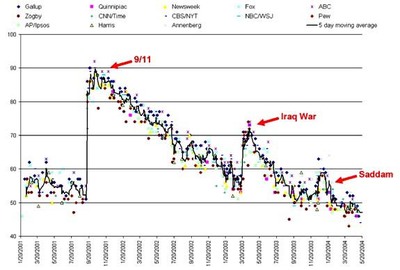I’ll throw my hat into the legal analysis ring, although you can (or will) find good analyses here and here as well.
UPDATE: A very fine first draft critique by University of Miami law professor Michael Froomkin can be found here. I say "very fine" because it mirrors my comments, plus a few more . . . and is better written then my hastily-crafted analysis below (as one would it expect it to be).
The Torture Memo can be found (in PDF format) here. What follows are some random thoughts as I pour over the memo in my not-so-copious free time:
Page 4: The memo states that the position of the United States viz the Geneva Convention. Specifically, the terms of the Convention do not apply to al Qaida detainees (because they are not a contracting party to the Convention), nor to the Taliban detainees (because they do no qualify as prisoners of war under Article 4 of the convention).
Oddly, two footnotes relating to these sentences have been blacked out. I wonder what they would have said.
And, even though it has been oft-debated, this point is worth mentioning again: Take a gander at Article 4 — the whole thing — and tell me why Taliban detainees don’t fit in at least ONE of those categories.
Page 6: The memo states that the U.S. is bound only by its understanding of what the Geneva Convention meant at the time it ratified it. Specifically, at the time of ratification, the U.S. thought the phrase "degrading treatment" was vague and ambiguous, but considered itself bound only to the extent that the treatment of prisoners violated the 5th, 8th and 14th Amendment.
That means, in a nutshell, that we agreed that we would not violate our own Constitution (particularly the part about "cruel and unusual punishment") with respect to prisoners under the Geneva Convention. Good to know.
Page 6 again:
In particular, the Department of Justice has opined that "under clear Supreme Court precedent, any presidential decision in the current conflict concerning the detention and trial of al-Qaida or Taliban militia prisoners would constitute a "controlling" Executive act that would immediately and completely override any customary international law"
In context, it is clear that "customary international law" does not mean the Geneva Conventions or treaties. But it begs the question: what is "customary international law" . . . at least for the purposes of this memo?
Page 7: Here’s where some fun begins.
Moving away from international law, the memo focuses on federal criminal law, specifically 18 USC 2340. That law pertains to acts of torture which "occur outside the United States". Under that statute, according to the memo, Guantanamo Bay Naval Station (GTMO) is NOT outside the United States jurisdiction (and it gives all kinds of reasons why, citing to internal DOJ opinions, the Patriot Act, etc.), and therefore — according to the memo — 18 USC 2340 does not apply.
Wait. back up. Gitmo is within U.S. jurisdiction? That’s odd, because this is what the DOJ argued in front of the Supreme Court a couple of months ago:
The Guantanamo detainees . . . are being held outside the sovereign territory of the United States. It is "undisputed" that Guantanamo is not part of the sovereign United States. – United States Brief
Bald-faced contradictions aside, the memo at least acknowledges (on page 8) that 18 USC 2340 would apply — in theory — to detainees in, say, Afghanistan.
Page 8: So how can one commit torture to detainees in Afghanistan and get around 18 USC 2340? Here’s the defense (according to the memo): The statute requires "specific intent". What this means, in non-legal terms, is that to violate that law, the wrongdoer must have in mind the specific illegal act. For example, if a prison guard strapped electrodes to a prisoner’s privates in order to cause bodily injury, that’s illegal. But if he did the exact same thing in order to extract information, that’s okay. See, it’s the purpose BEHIND the torture someone that makes the difference (so says the memo).
The memo also argues (at pages 11-13) that "good faith" may be a defense to the torture crime. So, for example, if the torturer believed in good faith that his torture would not result in serious/prolonged, physical/mental, pain/suffering, then he has a valid defense. Put another way, if Rush Limbaugh was doing the torture, he could get acquitted because he doesn’t see it as, you know, "torture". Whereas, someone who actually KNOWS better and understands the consequences of his torturing . . . would be guilty. Go figure.
Page 20: This is where the memo really goes off the rails.
In a section entitled "Commander-in-Chief Authority", the memo quotes an 1874 Supreme Court case, saying that it is "the President alone who is constitutionally invested with the entire charge of hostile operations". From that quote, the memo continues:
In light of the President’s complete authority over the conduct of war, without a clear statement otherwise, criminal statutes are not read as infringing on the President’s ultimate authority in these areas
Now where does THAT notion come from? It is true, I agree, that the president is constitutionally in charge of all wartime operations. That does NOT suggest — in ANY way — that he is above the law (as the latter quote indicates). Being in charge does not mean one gets to act outside the boundaries of law — it just means that one is in charge within the boundaries of law.
The memo then discusses how the Supreme Court has adopted a canon of statutory construction "in a manner that avoids constitutional difficulties so long as a reasonable alternative construction is available". This is true, but I admit to total confusion as to why this sentence was included. Is the author suggesting that the President has been given the power (by the Supreme Court) to avoid "constitutional difficulties"? If so, this is a frightening interpretation. When the Supreme Court adopts a canon of statutory construction, it does so for itself merely for the purpose of going about its business. Courts can apply the "avoidance canon" — not Presidents.
Still, the memo chilling concludes in this section (at page 21) that 18 USC 2340 "does not apply to the President’s detention and interrogation of enemy combatants pursuant to his Commander-in-Chief authority".
Let’s reflect on that logic for a moment. The President wears many hats, and is the chief authority in many realms, not just in wartime. For example, the Constitution states that the President "shall take Care that the Laws be faithfully executed" (Article II, Section 3), thus making him the Chief Law Enforcement Officer in the land. Can he, by virtue of that position and power choose to make (or ignore) whatever laws he wishes? No. Then why does he have such power in his Commander-in-Chief authority?
While we are in Constitution-land, what can be said of Article I, Section 8, Clause 18, which gives Congress to "make all laws which shall be necessary and proper for carrying into execution the . . . Powers vested by this Constitution in the Government of the United States, or in any Department or Officer thereof"? Doesn’t that fly in the face of the notion that the Commander-in-Chief authority gives the President carte blanche to circumvent laws?
And besides, as even non-lawyers know, no president is above the law. The Supreme Court said it in U.S. v. Nixon, and the attempt to create a "Commander-in-Chief" exception simply has no legal basis.
Page 22: The torture memo invokes Hamilton and Federalist No. 23., saying that national security was top priority for the Constitution’s framers. It then states that "the text, structure, and history of the Constitution establish that the Founders entrusted the President with the primary responsibility, and therefore the power, to ensure the security of United States in situations of grave and unforeseen emergencies".
Really? The Constitution says that? Where? Apparently it is the Commander-in-Chief Clause.
Mmmmm. Let’s go back to the Federalist Papers — this time to No. 69, because that’s what discusses the constitutional authority of the Commander-in-Chief. This was also written by Hamilton, by the way:
The President is to be commander-in-chief of the army and navy of the United States. In this respect his authority would be nominally the same with that of the king of Great Britain, but in substance much inferior to it. It would amount to nothing more than the supreme command and direction of the military and naval forces, as first General and admiral of the Confederacy; while that of the British king extends to the DECLARING of war and to the RAISING and REGULATING of fleets and armies, all which, by the Constitution under consideration, would appertain to the legislature.
Regulating our armies is a job for the legislature. Gee, what a concept. And they have done so, with 18 USC 2340, a law which the torture memo says the president (as C-I-C) can ignore.
Page 27: The Torture Memo gets into possible defenses that a "government defendant" could use if he were to be charged with violation of a criminal torture statute. This particular section states that he could use the "right of self-defense" defense. I won’t go into the whole law of self-defense, but this makes an interesting read, especially when it talks about "imminent" threats. Draw your own parallels.
Okay. I’m spent. Maybe more on this later. Maybe not.




